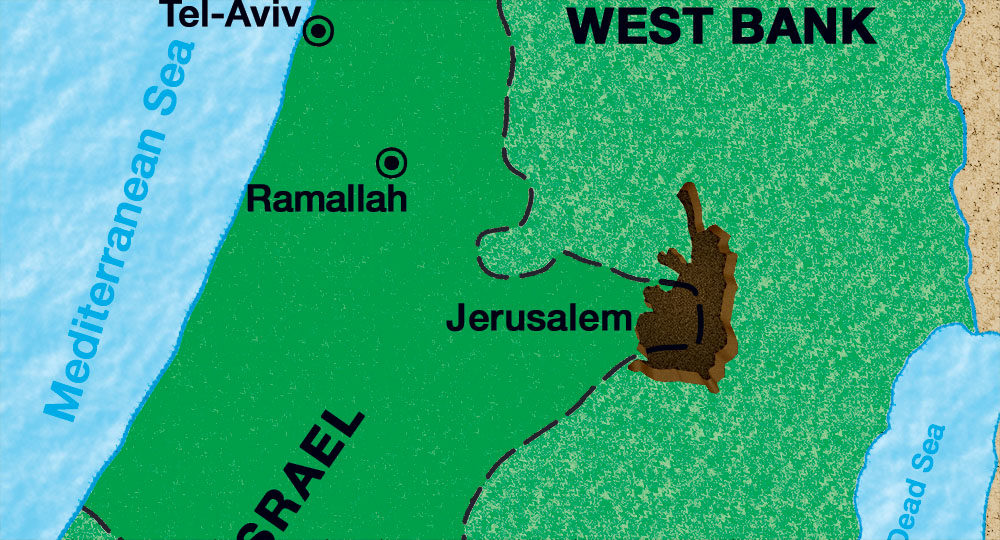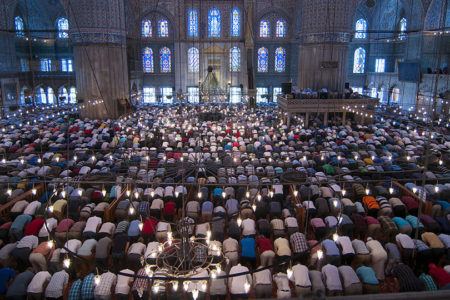Jerusalem: The Missing Link
When the pundits look back on 2004 and the attempts at an Israeli-Palestinian solution, the word disengagement will probably top their list. Ariel Sharon’s controversial “disengagement” plan called for a unilateral Israeli pullout from all of Gaza but only a limited withdrawal from the “West Bank.” It was only after intense, prolonged negotiations that Prime Minister Sharon secured Cabinet approval of his proposal. Palestinian leadership responded that it was a start but didn’t go nearly far enough, and Palestinian Authority (PA) Prime Minister Ahmed Qureia retorted that the PA was still waiting for Israel to implement a “total and comprehensive” pullout from “our Palestinian land.”
Yet even with all the fireworks over the “disengagement” policy, something was conspicuously missing. The entire process was somewhat akin to an elaborate wedding where the bridegroom, best man, friends, and presiding clergy are all there—but the bride fails to show up. For, during the entire “disengagement” furor, one integral piece of the geopolitical puzzle has been noticeably absent.
And that piece is Jerusalem.
We can hardly blame Sharon for not forcing the volatile issue. And it is not surprising that the Palestinian leadership hasn’t raised it—yet. But with or without “disengagement,” the central dispute over who controls Jerusalem, and how much, still waits to be addressed.
The Palestinian Position
Make no mistake—the official Palestinian approach to Jerusalem is clear and unmistakable: More is never enough.
Exhibit A: the actions of Palestine Liberation Organization (PLO) leader Yasser Arafat in October 2002. The U.S. Congress had just passed a resolution recognizing, once again, Jerusalem as the capital of Israel. That was nothing new. The Jerusalem Embassy Relocation Act of 1995, which passed both houses of Congress by huge majorities, had called on the United States to move its embassy from Tel Aviv to Jerusalem and to recognize Jerusalem as the Israeli capital. Even further, it declared that Jerusalem should remain the undivided territory of Israel. President Bill Clinton balked at complying, and President George W. Bush has not yet ordered the embassy to be moved.
But Arafat and the Palestinian leadership seized the 2002 congressional pronouncement as an opportunity to claim even more entitlement to Jerusalem. Arafat signed into PA law a resolution declaring that the entire city of Jerusalem belonged to the Palestinians, stating it was the capital of a future Palestinian state.
Palestinian officials and their intellectual supporters are still drumming the same beat to the same tune.
Anthropology professor Thomas Abowd, writing recently in the decidedly pro-Palestinian magazine Middle East Report, used the propagandistic language de jour so typical of the Arafat-PLO-PA position. It is no longer euphemistically “East Jerusalem,” which is inaccurate enough because there is no real dividing line, no indigenous separation, that would inform them where a “West” Jerusalem ends or so-called East Jerusalem begins.
But Abowd went even further. Now, he wrote, it is “occupied East Jerusalem.” Jerusalem, he said, is being occupied by “Israeli colonial authority.” The presence of Jewish residents in the eastern portions of the city constitutes “land theft” by Israel.
Jerusalem has been a long-standing sticking point, not only with the Palestinians but with the Arab league as well. Even as Israel was ceding the Sinai to Egypt in 1978, Egyptian President Anwar Sadat was talking about the right of Arab Muslims to exercise complete sovereignty over the eastern half of Jerusalem.
So, if we were to try to bring some reason to this often-unreasoned debate about who should control Jerusalem, where do we start?
#1 The fallacy of Internationalism
Some people find a certain superficial appeal to the argument that international law should govern this issue. After all, it was UN General Assembly Resolution 303, passed in conjunction with the founding of Israel, that proposed to rule Jerusalem through an international council. But it proved unworkable back then.
Following Israel’s successful War of Independence in 1948, where it had to fend off the attacking Arab states merely to preserve the statehood that the UN had formally recognized, neither Israel, nor Jordan—the two nations that controlled Jerusalem—would retreat from the city. In 1949 the two countries signed a peace treaty that set forth armistice lines dividing Jerusalem.
The treaty completely ignored the UN directive. So much for international policy solving the Jerusalem issue. One of the failures of externally imposed international solutions is that they so often ignore the realities of national autonomy.
But another problem exists with using an international approach to decide Jerusalem’s future. There is strong evidence that governing first principles of international law do not fit the unique history and context of either Israel or Jerusalem.
Most international law, even the international treaties and codes that exist in some official form, are based on something called customary law. In other words, when enough nation states over a sufficient number of years recognize certain national rights and duties in dealings with other
nations, these rights and duties “evolve” into a recognized basis of international law. Even when permanent global courts and institutions are created, such as the International Court of Justice in The Hague or the newly created International Criminal Court, the written laws they enforce can be traced back to the idea of customary law.
When two or more nations agree in writing to do a certain thing among themselves, the issue is clear because it is a simple matter of contract law. The dilemma arises, however, when two or more nations (or the UN Assembly) decide that customary law (or one of its variations) should be involuntarily imposed against another nation (like Israel) that would rather be left alone to decide how it should conduct matters within its own borders.
After all, who decides when a certain widespread practice among nations should turn into an enforceable, international standard? That question is often debated by legal scholars, but I have yet to see a satisfactory answer. Perhaps that is because radical internationalism is, at bottom, contrary to the idea of national sovereignty and separate nation-states, a concept ordained by God for the administration of order in the world and to avert the evils that come with centralized global power. (See Genesis 11:1–9 and Acts 17:26.)
Even more important, there can never be, by definition, any “customary law” for situations that are entirely uncustomary. The more unique the geopolitical issue is, the less likely we can really say that customary law should apply. And when it comes to the creation of the nation of Israel and the unique religious and historical significance of Jerusalem in particular, there simply is no parallel in world history.
That fact doesn’t stop the radical internationalists, of course. Case in point: the suggestion by the International Court of Justice that Israel’s security fence, which has more than proven its effectiveness in thwarting terrorists and suicide bombers, violates international law. Nevertheless, it is important to see that there is simply no valid international law basis for forcing Israel to bend on the issue of Jerusalem.
#2 History and Archaeology
There is powerful historical support for Israel’s claim to the entirety of Jerusalem.
Jerusalem was one of five confederations that opposed the Israelite campaign after the Exodus. However, Joshua did not secure it, unlike other areas (Josh. 15:8, 63).
Later King David attacked and seized Jerusalem and incorporated it under Israelite control (2 Sam. 5:7). Thereafter Jerusalem became known as the City of David.
This is the first of three Cs that corroborate Israel’s claim to Jerusalem. We can call this one the claim by justifiable conquest.
Second, David exercised dominion by extensive construction in Jerusalem. He moved his residence to that city and fortified it (2 Sam. 5:9). Later Jerusalem was the scene of massive rebuilding of its dilapidated walls by the Israelites after the Babylonian Captivity, as described in Nehemiah. The Israelites undertook further reconstruction in rebuilding the Jerusalem Temple, according to the book of Ezra.
Third, Jerusalem was consecrated. This event actually began long before David. On the hill that would later become the focal point in the central city of Israel’s history, the faith of Abraham was tested in a way that still confounds and amazes me as a father. As Abraham raised his rough, hand-tooled dagger, a weapon that was probably blood-stained from previous animal sacrifices, God called to him saying, “Lay not thine hand upon the lad, neither do thou anything unto him; for now I know that thou fearest God, seeing thou hast not withheld thy son, thine only son from me” (Gen. 22:12).
We are told that Abraham consecrated that very place by offering a sacrifice of a ram that the Lord had personally provided as a substitute; and then Abraham gave the place a name: Jehovah-jireh, “The Lord Will Provide.”
Later David made plans, in that same area, for construction of the first Temple, to replace the Tent of Sanctuary (1 Chr. 22:2–19; 28:1—29:19). Solomon, David’s son, built it in Jerusalem.
Yet some contemporary archaeologists dispute the accuracy of this historical record. For instance, Dr. L. Steiner suggested in a recent book that, contrary to biblical accounts, Jerusalem may not have been the capital city of the “unified monarchy” of David and Solomon. She bases that view on the “lack” of artifacts and pottery uncovered by archaeologists from the Late Bronze Age in Jerusalem.
But Hershel Shanks, editor of Biblical Archaeology Review, countered by saying that the existence of biblical Jerusalem is unquestionably established by even older Egyptian cuneiform tablets that specifically refer to the existence of the city. He also pointed to an impressive “stepped stone” structure, suggestive of extensive fortifications, which has been unearthed on the eastern slope of the City of David. It dates all the way back to the time of the judges—several hundred years even before David.
#3 Sola Scriptura
In light of all of these conflicting opinions about Jerusalem and whether internationalism should rule its future or whether the record of the past is sufficient to settle Israel’s claim over the city, what is the end of the matter? In the final analysis, the only opinion that really matters is God’s. And He is not silent on the issue.
The title deed to the land of Israel and “all [emphasis added] the land of Judah,” which therefore included Jerusalem (Dt. 34:2), was granted by the Word of the Lord Himself (Dt. 34:1–4).
That God has blessed Israel’s modern dominion over Jerusalem is self-evident, from the justifiable conquest of Jerusalem in 1967 during the Six-Day War to the marvelous construction in and around Jerusalem. Compare that modern, blooming city today with Mark Twain’s observations in the late 1800s, when he described the approach to Jerusalem as so barren and ruined that it was “tiresome to the eye.”
So, what is left for us to do then, those of us who love Israel?
We must consecrate the city of Jerusalem to the Lord through our vigilant prayers and tireless support.
And we must always remember that Jerusalem’s future course rests securely within the sovereignty of God:
As we have heard, so have we seen in the city of the Lᴏʀᴅ of hosts, in the city of our God; God will establish it forever (Ps. 48:8).







